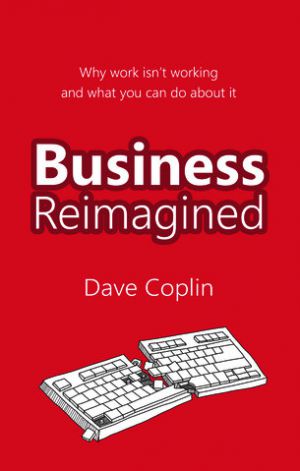
Dave Coplin is the chief envisioning officer for Microsoft UK and an established thought-leader in the UK when it comes to the application of technology to solve real-world problems. His new book, Business Reimagined, is a refreshing approach to the future of collaboration and how technology should liberate rather than constrain. He conveys a new system of working that breaks free from the stereotypical view of the office and the constraints that the modern workplace has on its employees.
Coplin begins by noting that a study revealed that 71% of American workers did not engage with their jobs, pinpointing this staggeringly high figure to the idea that the common model of the office is very dated, and not compatible with the digital era in which we live.
As a student about to undertake his final year at university, expectations of the workplace are made through various work experiences and portrayals in the media of an ?office environment?. Commonly, the office is viewed as mundane and lifeless but Coplin feels this can be radically improved.
His chapter titled ?Working like a Victorian? recognises that the vast improvements made by technology in the workplace are somewhat demeaned by a model of working that goes back to the Industrial Revolution. As Coplin states, ?Today we still reward work done in terms of time - hours worked. This owes itself to the industrial drive for business efficiency through standardisation, the production line model of work.?
Coplin argues throughout the book that with the technology accessible to people at home, the physical constraints of a desk at an office is not needed on a daily basis. He recognises that time spent in the office can be very valuable for conversing and sharing ideas with other employees, but his argument is that going into the office is often not essential, and that employees should have more freedom in where they choose to work.
Coplin portrays a somewhat negative embodiment of the hierarchical structure within an office environment in the chapter titled ?The Antelope of the Open Office?. In it, he compares working in an open-plan office to the African Savannah, drawing a link between the employees and their similarities to the antelope in the middle of the Savannah with the surrounding predators in close proximity, presumably referring to those in authority. This observation, however, seemed to me an exaggerated view and a generalisation that assumes all open-plan offices operate to exactly the same potential.
Also, Coplin argues for a change to the stereotypical model of how businesses operate but he fails to recognise that there is not a law that holds businesses into operating in this way. An office with 9-to-5 shifts is often what people want as it means that they can schedule their free time around their work. Coplin?s alternative, despite being a refreshing approach to updating the way in which businesses operate, is essentially less structured and could itself leave some people feeling detached from the workplace.
From the perspective of this student though, Coplin does draw upon the inappropriate, mundane aspects of office work that seem to eat up valuable hours of the day. The recurring theme in the book is for the author to compare problems he sees in the workplace and to offer something ?slightly more engaging?. Using emails for almost everything in the office is an irritation, and Coplin rightly describes us as slaves to our inboxes where email is a prime example of where technology becomes prison rather than release.
Often, students can have negative preconceptions of work and the 9-5 culture of sitting at a desk. Coplin?s approach is far more appealing than his contrasted Victorian way of working. From this undergraduate?s perspective, Coplin?s ideas for reforms to the workplace are incredibly appealing, offering to bring the way in which we work in line with the technological advances of the 21st century.